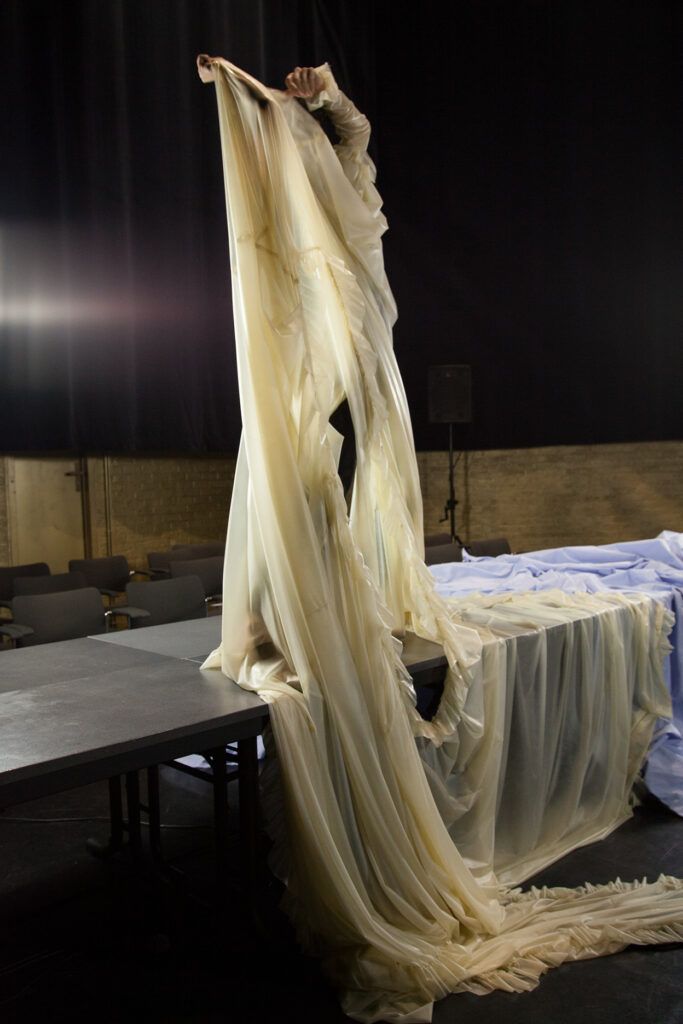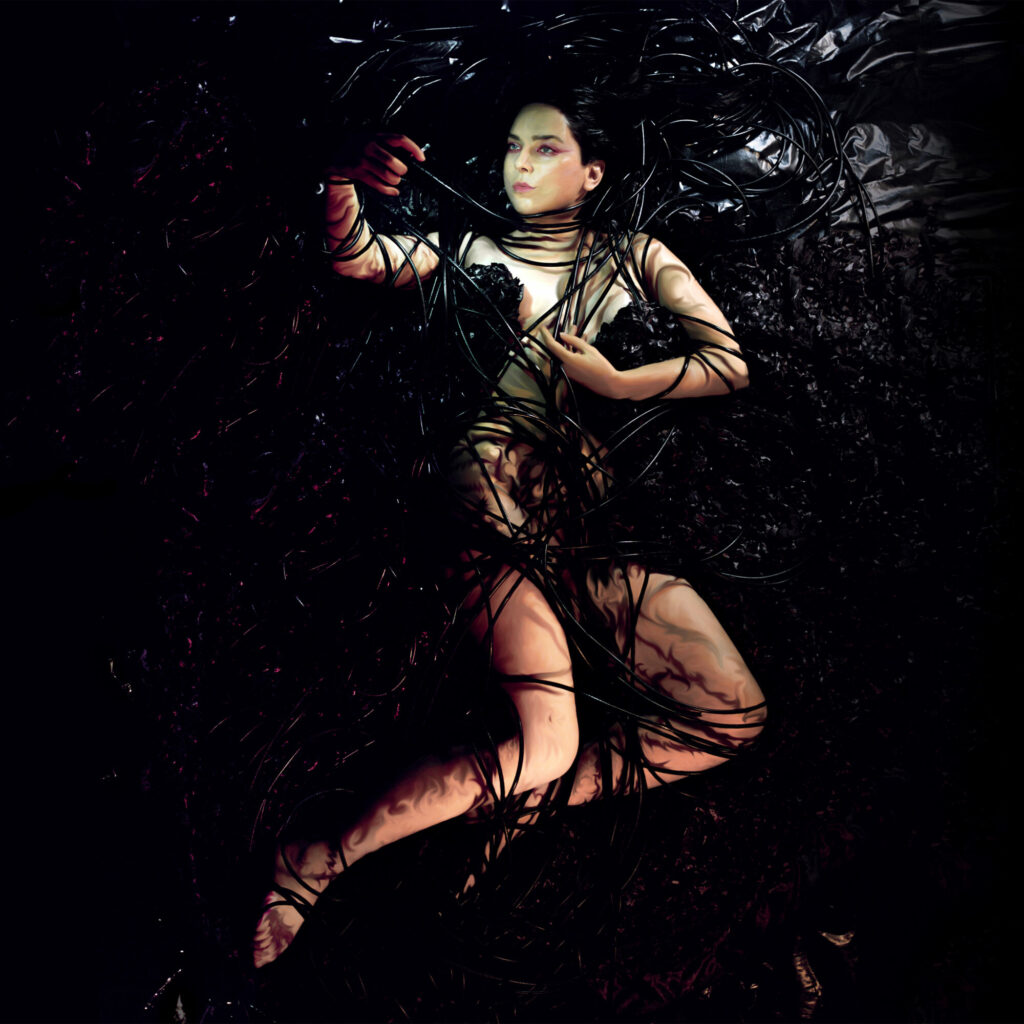Cecile Believe und Price lernten sich auf einer Party und einem gemeinsamen Konzertbesuch von Charlie XCX in L.A. kennen. Beim Impulstanz Festival 2021 zeigen sie die Österreich-Premiere ihrer Performance »Melodies are so far my best friend«. Im Interview sprechen sie über die Bedeutung von Pop im Theater, wie sich ihr Stück in den letzten Jahren entwickelt hat und ihre Interpretation von Scheitern.
The Gap: »Melodies are so far my best friend« is described with terms like radical immersion and merciless unmasking of theater conventions. What can the audience expect without you spoiling too much?
Price: Many things can go wrong, since the fabric is very heavy and we left certain parts undefined. And that’s where improvisation comes in. It may sound weird, but it minimizes stress on stage, because I don’t have to move from A to B within a certain time like I would have to when the performance would be based on playback samples.
Cecile Believe: I would say don’t expect to be too comfortable. Many people love the piece but there have been some strong negative reactions too. I think it is challenging and it is designed that way.
The credits say that you produced the music, Cecile, but there are also musical credits for PRICE. That’s kind of confusing, can you please explain how your cooperation worked and how you got to know each other?
Cecile Believe: Price and I collaborated quite a bit. Mathias would write melodies and come in with some chords and I would fill it out with instrumentation. Sometimes Mathias would tell me what he imagined and I would try to create the idea.
Price: I don’t have a finished map of what I want in my productions. Cecile has lots of elaborated inputs and together we are capable of creating collaborative ideas. Our work revolves around moods and feelings and sometimes we’re exchanging demos to come closer to our shared visions step by step. Also, when it comes to the technical side of producing, mixing and mastering, Cecile is the pro obviously. There’s a shared interest and humour between us, so we just decided to go our way together with this piece to see where it will lead us to. Also, there’s Sebastian Hirsig, a Jazz pianist and he’s also performing live with us during the show. Him I knew for longer from my hometown and I really wanted the music in this performance to be different from previous shows. Usually you have finished and produced tracks for scenes and you play them one by one. But in »Melodies are so far my best friend« we break out of this and leave space for improvisation, since we cannot cue everything that accurately.

You first played the piece about three years ago in Zürich. How much room for interpretation is left after that much time working and playing together in the context of one certain piece and how did the piece itself change overall since you first played it?
Cecile Believe: There is not that much room for interpretation left, true. We are mostly by the script by now but there are different moods and different audiences that do contribute to uniqueness in each show.
Price: We started with sharings during the process, where we showed unfinished bits and pieces to an audience to find out what’s working and what resonates in which kind of way. Also, I think that the premiere is often not the best representation of a performance. Afterwards some parts get adapted and we change little elements until the show grows into its very own character after a few times of playing it in front of an audience. The architecture of the space we show it in does also play a role and changes parts of the piece everytime we play it at a new location. So, the piece in itself is constructed and not a piece that works with free improvisation where we surprise each other on stage. And when it comes to the audience, the show is not participative at all, they don’t have to do something, but still the audience will play its part in the piece.
Melodies itself are a topic of identity and community for what it’s worth. I have the feeling that you are working a lot with the contradiction of melodies that »work« with an audience and those who are kind of disruptive. Am I right with this interpretation and can you elaborate on that?
Price: Basically the process was about the constant adaptation of the same chord progression, covering, sampling from the same source to see where we can take it. So we restricted ourselves from the infinite possibilities of melodies one can play and set a kind of pop-ish melodies from which we all departed. Sebastian for example moved right into the more jazz-y kind of vibe.
Cecile Believe: We also discussed a lot about what Pop music was and is, actually. I guess, it can be very open, so that pop music can also be a weird little hook only that people remember.
Price: Sometimes it was fun, because there are so many definitions of what pop music is and we kind of took some parts of all of those descriptions to form our musical way around what we understand as pop to create the piece from there.

Did you have certain pop songs and artists in mind while you worked on this piece or is it more a self-reference kind of thing?
Cecile Believe: I think we asked ourselves mainly what kind of spaces there are where certain songs are played. We thought the music a lot like being outside of a club and hearing the rumble, but not the clear music like inside. Space dictates genre, that was our approach. The context in which you hear songs and the surroundings in which they are perceived.
Price: And of course we refer to other artists as we orientate along Pop culture. But in our creation it’s more of a feeling than certain pieces of music.
The piece is described with a focus on imperfection and failure out of a queer perspective. I think that sounds positively intriguing. In today’s societies failure is kind of a taboo. We learn that it isn’t normal to admit mistakes. What are your experiences regarding this?
Cecile Believe: Well, since this was my first musical work for theater in this kind of way I think I learned that the concept of failure is based on the assumption of success. As success is a preconceived notion of outcome. Or at least the idea of this. Personally I had to adapt in the way of loosening my expectations of music and what kind of role it performs. Because usually I release records and I play pop music shows at clubs and bars. There completely different in structure from what Mathias and I created together. In the process I had the feeling of failing at my job making pop music, which was ultimately just an expansion of my work portfolio and what I felt was my skills in contributing to the world. So, yeah, my own perception of music in a live context changed a lot during this process.
Price: I always got asked why I always try to bring pop into the art world, because it is perceived as a shallow work with different values compared to the rest of the art world. In my opinion this is a misconception, since values shift so much all the time and it all depends on the context in which you show your art. And this perception of pop music made me insecure from time to time and brought me close to the feeling of failure. Misplacing a genre in different contexts is where the important questions can come from, I guess. I like the feeling of ambiguity.
Cecile, you made music under the moniker »Mozart’s Sister«, is there a deeper connection between you and Austria?
Cecile Believe: Well, no. With this moniker I didn’t really think of Mozart as a person from a place, but more as a representation. Kind of like being a female in the shadow of a genius that didn’t get credit. But I see what you are saying and I haven’t been to Austria ever, so now I feel silly that I didn’t do my research well.
Mathias, is your alias Price a reference to prince? There’s a certain similarity in your looks.
Price: Haha, no. But it is a valid question, since I sometimes even get introduced with my name as a word play with Prince – but I never even mentioned or intended that. But hey, if people make associations with what the source of something is, that’s okay. I’m fine. Actually I just wanted a name that looked good in a typographic kind of way. I remember that I was looking a lot on Prada and brands and developed it from that. That’s why I write it in capital letters only to make it look and feel more like a brand. For me it resembles the difference between the private and the public self and I chose that brand-reference to make it look like a material, something I work with.
The Austrian premieres of »Melodies are so far my best friend« will be shown at Sunday, August 8th and Tuesday, August 10th at 9pm at Kasino am Schwarzenbergplatz. Tickets are available at impulstanz.com. Cecile Believe will also perform a concert on August 7th at the Impulstanz Festival Lounge at Kursalon Wien, Stadtpark. Supported by Joja, presented by The Gap.
